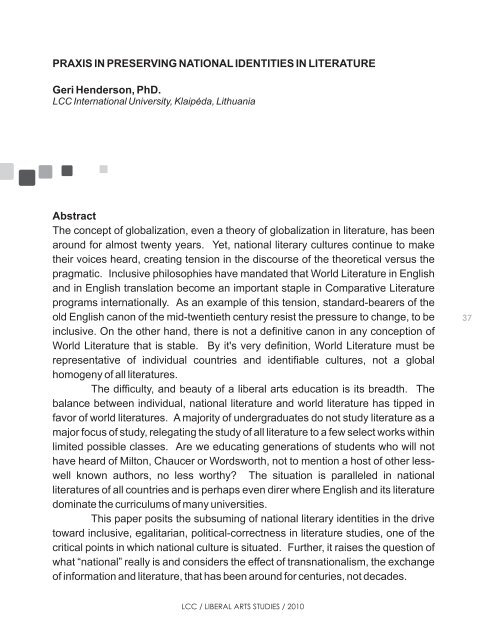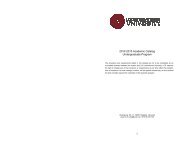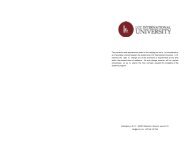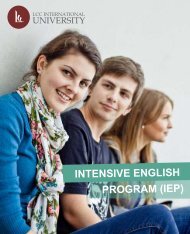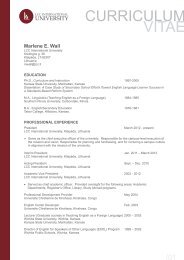lcc liberal arts studies / 2010 volume iii - LCC International University
lcc liberal arts studies / 2010 volume iii - LCC International University
lcc liberal arts studies / 2010 volume iii - LCC International University
Create successful ePaper yourself
Turn your PDF publications into a flip-book with our unique Google optimized e-Paper software.
PRAXIS IN PRESERVING NATIONAL IDENTITIES IN LITERATURE<br />
Geri Henderson, PhD.<br />
<strong>LCC</strong> <strong>International</strong> <strong>University</strong>, Klaipëda, Lithuania<br />
Abstract<br />
The concept of globalization, even a theory of globalization in literature, has been<br />
around for almost twenty years. Yet, national literary cultures continue to make<br />
their voices heard, creating tension in the discourse of the theoretical versus the<br />
pragmatic. Inclusive philosophies have mandated that World Literature in English<br />
and in English translation become an important staple in Comparative Literature<br />
programs internationally. As an example of this tension, standard-bearers of the<br />
old English canon of the mid-twentieth century resist the pressure to change, to be<br />
inclusive. On the other hand, there is not a definitive canon in any conception of<br />
World Literature that is stable. By it's very definition, World Literature must be<br />
representative of individual countries and identifiable cultures, not a global<br />
homogeny of all literatures.<br />
The difficulty, and beauty of a <strong>liberal</strong> <strong>arts</strong> education is its breadth. The<br />
balance between individual, national literature and world literature has tipped in<br />
favor of world literatures. A majority of undergraduates do not study literature as a<br />
major focus of study, relegating the study of all literature to a few select works within<br />
limited possible classes. Are we educating generations of students who will not<br />
have heard of Milton, Chaucer or Wordsworth, not to mention a host of other lesswell<br />
known authors, no less worthy? The situation is paralleled in national<br />
literatures of all countries and is perhaps even direr where English and its literature<br />
dominate the curriculums of many universities.<br />
This paper posits the subsuming of national literary identities in the drive<br />
toward inclusive, egalitarian, political-correctness in literature <strong>studies</strong>, one of the<br />
critical points in which national culture is situated. Further, it raises the question of<br />
what “national” really is and considers the effect of transnationalism, the exchange<br />
of information and literature, that has been around for centuries, not decades.<br />
<strong>LCC</strong> / LIBERAL ARTS STUDIES / <strong>2010</strong><br />
37


